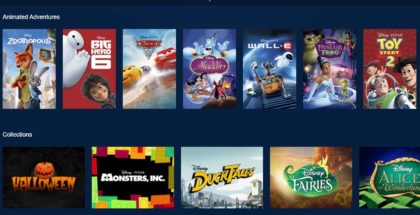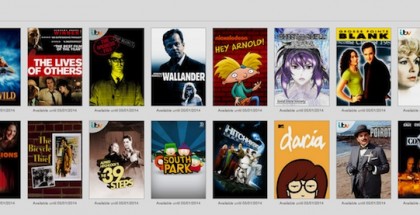Netflix UK vs Amazon Prime Instant Video (formerly LOVEFiLM) – 2014
David Farnor | On 28, Sep 2014
Which is better, Netflix UK or Amazon Prime Instant Video? It’s a question VODzilla.co asks itself every day while deciding what to stream online.
Our searchable directory lets you see what’s on Netflix UK vs what’s on Amazon Prime Instant Video making it easier to compare the two. But what if you only have the funds for one? Which service should get your subscription moneys?
The game has changed a lot in 2014 – not least because Amazon has renamed its LOVEFiLM Instant service to Amazon Prime Instant Video. Since then, it has signed a slew of new deals for exclusive content, enough to rival Netflix’s ever-expanding catalogue. Netflix, meanwhile, has moved into new countries, raising its monthly subscription to fund the expansion.
So who’s ahead in the great streaming race?
We break down the benefits of each:
Cost
Neither Netflix UK nor Amazon Prime Instant Vidoe break the bank: the aim is to make it as easy and affordable as possible to win over new customers. Netflix, though, has raised its prices in the past year. It now costs £6.99 per month for an HD subscription on up to two devices/screens simultaneously. (A £5.99 subscription will allow you to stream things in SD to a single screen.)
Amazon Prime Instant Video is slightly cheaper at £5.99 per month, which gives you access to all of the online streaming titles. If you upgrade to a full Amazon Prime membership, you get unlimited video streaming, free next-day delivery in the UK and free borrowing of Kindle books from Amazon’s library of selected ebooks for £79 per year.
Winner: Amazon
Free trial
Netflix offers a free trial for one month. Amazon does not.
Winner: Netflix
Content – TV
Do they have Breaking Bad? Or Doctor Who? What about Lost? Or Mad Men? This is where it gets a bit harder to follow.
Netflix has Breaking Bad. All of it. Amazon Prime Instant Video doesn’t. For many, that’s a decision made.
Amazon, though, does have a range of others, including titles from Sony and NBC Universal, such as the recently cancelled (and resurrected) Community, Mad Men, The Walking Dead, Lost and Parks and Recreation. Netflix’s own agreements include exclusives such as It’s Always Sunny in Philadelphia and Dexter.
Both platforms also share licences to Disney movies and BBC TV shows – whenever Doctor Who or Pocahontas is released on one, it is released on another.
Here is a list of major TV shows and which service has them:
Amazon
Mad Men (Seasons 1 to 4)
The West Wing (all of it)
Heroes (all of it)
Lost (all of it)
Battlestar Galactica (all of it)
Parks and Recreation
Community (Seasons 1 to 5)
The Walking Dead (Seasons 1 to 3)
Vikings (Seasons 1 to 2)
Black Sails (Season 1)
Extant (Season 1)
Under the Dome (Season 1)
Batman Beyond
Sherlock (Seasons 1 to 2)
Doctor Who
Luther (Seasons 1 to 3)
Netflix
Breaking Bad (all of it)
Homeland (Seasons 1 to 2)
Hemlock Grove (Seasons 1 to 2)
The A-Team (Seasons 1 to 5)
The Shield (all of it)
The Killing (Season 1)
The Killing (US remake)
BoJack Horseman (Season 1)
Orange Is the New Black (Seasons 1 to 2)
House of Cards (Seasons 1 to 2)
Pokémon: Indigo League
Person of Interest (Seasons 1 to 2)
Star Trek: The Next Generation
Suits
Sons of Anarchy (Seasons 1 to 5)
Rake
Downton Abbey
Doctor Who
Sherlock (Seasons 1 to 2)
Luther (Seasons 1 to 3)
Buffy the Vampire Slayer (all of it)
Shows not on either
Game of Thrones
The Wire
Winner: Draw
Content – Movies
While Netflix has traditionally always been better at TV and Amazon Prime Instant Video better at movies, the two are increasingly evenly matched here too. At one point, neither service boasted titles since 2011, but even this has started to change.
Why? Well, it’s partly Sky’s Now TV, which snaps up the exclusive rights to most new studio titles, leaving Netflix and Amazon to fight over the scraps 12 months later.
Nonetheless, Netflix has its own deals for Disney’s Marvel franchises, including Avengers Assemble. A deal with Lionsgate means that The Hunger Games (and The Hunger Games: Catching Fire) are both available, while an exclusive agreement with Warner Bros. has given it the rights to The Hobbit series.
But Amazon has its own Warner Bros. contract, which means that it now boasts almost all of the Batman films, not to mention Inception. Deals with Sony and NBC Universal also give Amazon the rights to acclaimed titles such as Soderbergh’s Contagion, which adds to its impressive range of arthouse and indie titles, from The Broken Circle Breakdown to Johnnie To’s Drug War.
Winner: Draw
For mainstream blockbusters, Netflix is more likely to meet your needs. For world cinema, Amazon is becoming a respectable authority.
Exclusives / Originals
With Sky securing dibs on the shiniest things, exclusives are where battle lines are being drawn. And not just exclusives on old series, but new, original things too – the providers are becoming programmers in their own right.
Netflix made the first mark in the sand with House of Cards in 2013 – and it’s one heck of a mark. Starring Kevin Spacey and directed by David Fincher, it’s a cracking political series which has offered a second season this year. Orange Is the New Black and Arrested Development have added to its line-up, but its scope is becoming increasingly ambitious: a Daredevil mini-series will start a range of exclusive Marvel adventures, while Netflix also owns the rights to Gotham (once it has aired on Channel 5 in the UK).
Amazon, meanwhile, has started to produce its own content too, giving audiences the chance to vote on their favourites from a batch of TV pilots. The first few (Alpha House and Betas) may not have been very impressive, but like Amazon, its sights are climbing higher, attracting better and better talent. David Gordon Green directed one of the most recent pilots, Red Oaks, as well as Whit Stillman.
September 2014, meanwhile, marked the premiere of Transparent, a show about a father who comes out to his family as a woman. Starring Jeffrey Tambor and by the creator of Six Feet Under (Jill Soloway), it feels every bit as groundbreaking as House of Cards and every bit as important as Orange Is the New Black.
Winner: Netflix (for now)
Compatibility
As of 2014, Netflix and Amazon Prime Instant Video now both have apps for PS3, PS4, Xbox 360, Xbox One, iOS devices, Android devices (including Kindle Fire tablets) and also work on PCs and Macs.
Netflix is available on Apple TV – Amazon Prime Instant Video is not. Netflix is also available on Roku boxes – Amazon Prime Instant Video is not. (Expect the latter to change very soon.)
Both apps remember where you were last during playback, so if you pause it while watching and switch devices, you can pick up where you left off.
Winner: Draw
Video quality
Officially, Netflix and Amazon Prime Instant Video offer 1080p full HD streaming quality. In reality, that depends on a lot of other factors. You can expect a minimum of 480p, though, depending on your internet connection and home network set-up.
Netflix does have pan and scan versions of many titles – a fault of the distributors providing the video files, rather than the service itself.
Winner: Both
Conclusion
Netflix vs Amazon Prime Instant. It’s a tough decision to make. Both have strong catalogues of content, especially compared to a year ago. Netflix has better original content – so if you want to watch House of Cards, that’s where to go – but Amazon also offers rentals and downloads, so even if you go with Amazon’s subscription, you can still get some Kevin Spacey action. If you prefer arthouse films or want some Batman in your life, Prime Instant Video is most likely to be your friend. It is also £1 cheaper per month. Netflix, on the other hand, is far easier (and nicer) to browse.
It all comes down to your personal preferences. But one thing is certain: if there was a difference between the subscription rivals 12 months ago, that gap has now been closed.




















